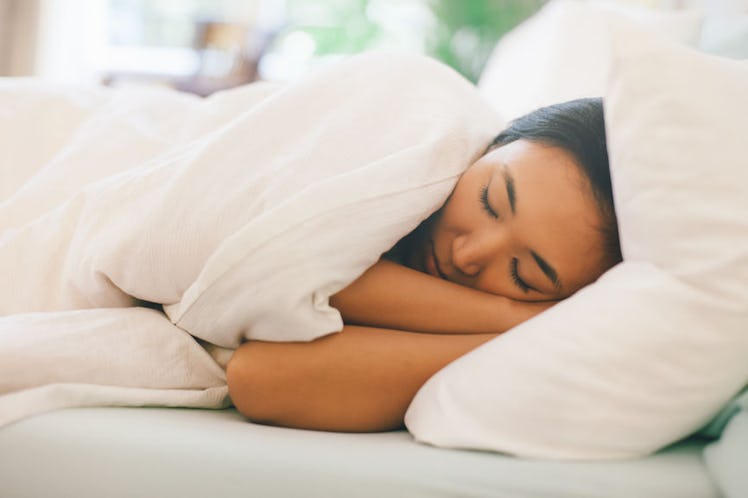
Experts Reveal How Sleeping On Your Side Every Single Night Affects Your Health
When you lie down to go to sleep at night, what's your go-to comfy position? For me, the fetal position is where it's at, and I pretty much can't sleep at all unless I'm curled up into a ball on my side (the left side, to be exact). But what does sleeping on your side mean for your body? Is it secretly the worst sleeping position ever for your back, or can you snooze on your side to your heart's content?
Well, for one thing, if you love to curl up on your side when you get into bed, you're definitely not alone: According to Bill Fish, a certified sleep science coach and co-founder of Tuck Sleep, lying on your side is one of the most common sleeping positions. And as for how that position affects your body throughout the night, Fish tells Elite Daily that, depending on the person, it can actually sometimes be a good way to keep your spine aligned, as long as you're sleeping on a pillow that doesn't make you crane your neck. Basically, if you're a side-sleeper, just make sure your pillow is big enough to support your head so that you're not pulling any muscles in your neck in order to get comfy.
That being said, though, there are a couple of drawbacks to sleeping on your side. For instance, Fish says, lying on your side all night might not be great for your skin. "When we sleep on our backs, our skin naturally stays in its place," he tells Elite Daily over email. However, he explains, when you sleep on your side, not only is half of your face pressed into a pillow for roughly eight hours a night, but the position in general can also cause some skin sag and stretch. The good news is, there's a really easy fix for this: satin pillowcases, which won't form those weird lines in your face, no matter how hard you pass out.
Now, despite the fact that Fish says sleeping on your side is relatively harmless for your back, physical therapist Dr. Jasmine Marcus warns that "people with chronic shoulder, hip, neck, or back pain may find that their symptoms are aggravated when sleeping on their side." Specifically, she tells Elite Daily over email, "women with hips wider than their shoulders" may feel more pain in their back when sleeping on their side throughout the night, as the position basically bends the body sideways, and depending on your proportions, this may leave you feeling really achey and crappy come morning.
So, generally speaking, sleeping on your side probably won't lead to any major health issues in the long run, as long as you don't already live with some form of chronic pain. But if you're looking to switch up your sleeping position for the sake of your comfort or well-being, Fish recommends using an extra pillow to help with the transition. If you want to start sleeping on your back, for instance, the sleep coach tells Elite Daily that your best bet is to put a pillow between your knees, as that'll make it more difficult for you to roll over onto your side while you're sleeping at some point throughout the night without removing said pillow.
"If you are looking to switch to sleeping on your stomach, it is best to look to see if there is any sag in your mattress," Fish explains. "If there is [any sag] at all, your spine [won't be] properly aligned." To keep things copacetic for your back, he recommends placing a pillow beneath your hips, which will "elevate your spine to the proper alignment."
In Dr. Marcus' opinion, however, there really is no "best" position to sleep in. If sleeping on your side feels uncomfortable, she suggests sleeping on your back, as it'll keep your spine aligned in the most consistent way. And while you can definitely use Fish's pillow-in-between-the-knees trick to help you stay on your back throughout the night, Marcus recommends an even comfier strategy: surround your entire body with pillows to discourage yourself from turning over in the middle of your snooze. I mean, hey, any excuse to sleep with extra pillows sounds good in my book.